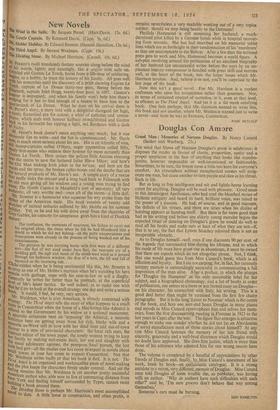Douglas Con Amore
Grand Man : Memories of Norman Douglas. By Nancy Cunard (Seeker and Warburg. 25s.) THE wind that blows off Norman Douglas's prose is salubrious: it disposes the reader in favour of clarity, proportion, sanity and a
proper scepticism in the face of anything that looks like mumbo- jumbo, however respectable or well-intentioned or fashionable. Sometimes, to be sure, the breeze turns a little too keen for everyone's comfort. An atmosphere without metaphysical °zones will invig- orate one man, but cause another to turn purple and claw at his throat. Such is life.
But so long as free intelligence and wit and lightly-borne learning count for anything, Douglas will be read with pleasure. Good sense in this intransigent Apollonian, who had read the bleached stones of Hellenic antiquity and heard its hard, brilliant voice, was raised to the power of a passion. He had, of course, and in good measure, the defects of his virtues, and there are times when his dislike of humbug appears as humbug itself. But there is far more good than bad in his writing and before any elderly young moralist begins the expected ritual of dancing on Douglas's grave he would do well to read all his books and make sure at least of what they are not—if, that is to say, the fact that Lytton Strachey admired them is not an insuperable obstacle. As to Douglas himself—well, even if one discounts 90 per cent, of the legends that surrounded him -during his lifetime, and to which his mode of life must have given rise in abundance, it must be owned that there are aspects which do not altogether please. Not, I think, that one would guess this from Miss Cunard's book, which is all affection and loyalty. But I am not carping; for, in fact, her curiously scrappy memoir is outstandingly successful in communicating a full impression of the man alive. After a preface, in which she plumps for 'Douglas the Humanist' as the only reasonable label for her subject, and a biographical chronology, and a list of books in order of publication, one comes to a more or less formal essay on Douglas— on his character, his connection with Italy, his writing. This is a good deal better than might be surmised from the first few chatty paragraphs. But it is the long 'Letter to Norman' which is the centre of the book, and here one secs and hears Douglas in many places and moods as Miss Cunard apostrophises him and relives her mem- ories, from the first disconcerting meeting in Florence in 1923 to the last years in Capri after the war. The figure that emerges is attractive enough to make one wonder whether he did not (as an Aberdonian of sorts) manufacture most of those stories about himself? At any rate Miss Cunard honours the memory of her late friend with sincerity, generosity and a well-bred directness which Douglas would
no doubt have approved. She does him justice, which is more than those of his admirers who admired him for one wrong reason have done.
The volume is completed by a handful of appreciations by other friends of Douglas and, finally, by Miss Cunard's assessment of his work, book by book—an enthusiastic catalogue. It is a strong antidote to a recent, very different, memoir of Douglas. Miss Cunard once told Douglas oT some trouble she, as publisher, was having
with an author. 'Why do authors have such difficulties with each other?' said he, `I'm sure grocers don't behave that way among themselves.'
Someone's ears must be burning.


































 Previous page
Previous page